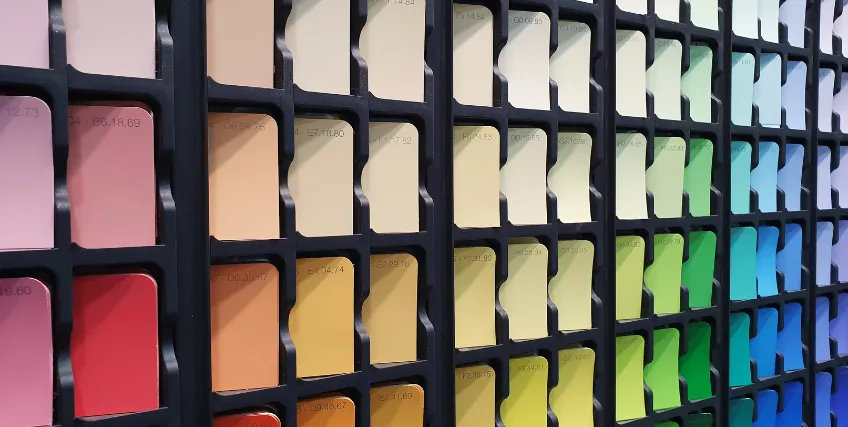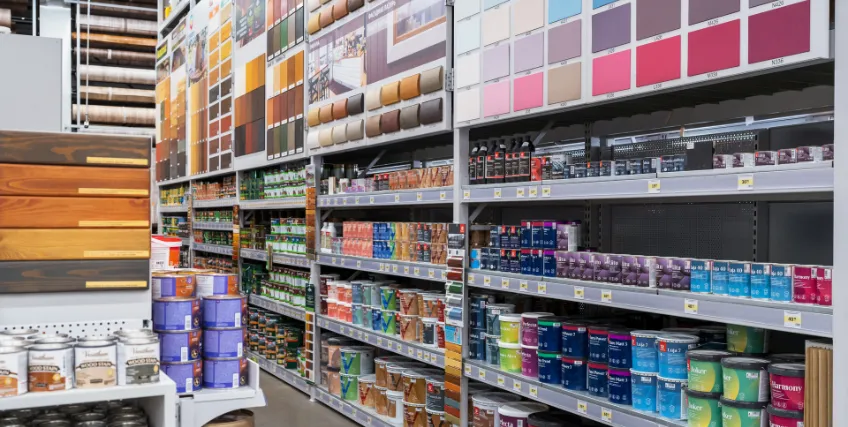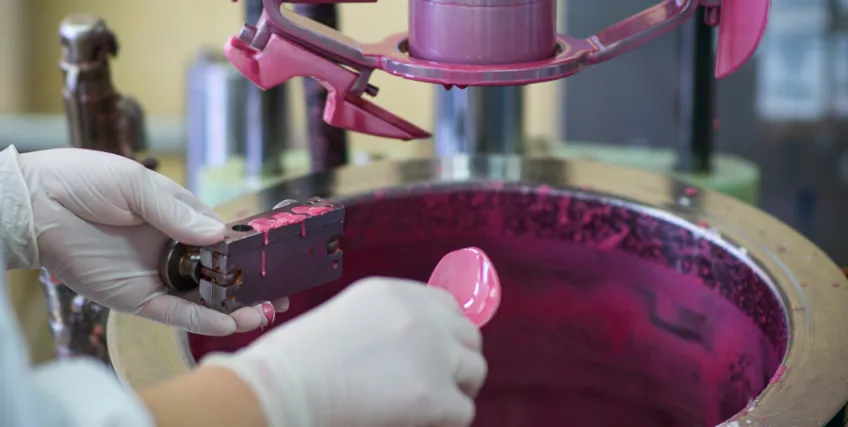Power Your Next Paint Line
With Smart Financing Options
Looking for Business Financing?
Apply now for flexible business financing. Biz2Credit offers term loans, revenue-based financing, lines of credit, and commercial real estate loans to qualified businesses.
Set up a Biz2Credit account and apply for business financing
Paint manufacturers across the U.S. are facing tighter margins, rising raw material costs, and mounting regulatory demands. The need for accessible and reliable capital has never been more urgent. Whether it's to purchase high-volume pigment batches, upgrade to VOC-compliant machinery, or meet payroll during slow seasons, strong cash flow makes the difference.
Loans for paint manufacturers can support essential business needs like equipment upgrades, inventory stocking, or even facility expansion. With a good credit score and solid sales, borrowers can explore several financing options that offer flexible repayment terms and competitive rates.
Manufacturers also need to factor in safety standards from agencies like Occupational Safety and Health Administration (OSHA) or Environmental Protection Agency (EPA). If your plant isn’t meeting current environmental requirements, you could face downtime or fines. That’s where a well-structured small business loan comes in. It helps cover compliance upgrades, warranties, and even paint booth ventilation systems.
And if you’re launching a new business or expanding into custom paint jobs for large home improvement chains, funding is crucial. A line of credit or a loan for paint manufacturers can provide the working capital you need to seize those contracts.
As the coatings sector continues to grow, tapping into the right capital channels can give your painting company a real edge.
What Business Loans Can Help Cover for Paint Manufacturers
Paint manufacturing isn’t just about pigments and resins. It’s about staying ahead of fluctuating material costs, meeting regulatory demands, and delivering quality on time. The right loans for paint manufacturers can bridge financial gaps and fuel long-term growth. Here’s where those funds typically go.
1. Raw Materials and Bulk Supplies
Raw materials like titanium dioxide, binders, and solvents often need to be purchased in bulk. Prices fluctuate based on global oil rates and demand. Having access to fast capital helps secure upfront inventory without stressing working capital. The right financing options allow you to lock in better supplier pricing while keeping production on track. This improves your cash flow and protects your margins when paint sales fluctuate.
2. Machinery, Tools, and Paint Booths
Manufacturing quality paint needs precision tools. That includes high-speed dispersers, mixing tanks, sprayers, and industrial paint booth systems. Most of these machines carry a hefty price tag. With equipment financing or commercial painting business loan products, business owners can break costs into manageable monthly payments and preserve working capital for other needs.
3. Compliance, Safety, and Regulatory Costs
Meeting environmental standards is mandatory. From reducing VOC emissions to installing OSHA-compliant ventilation, paint shops are under pressure. These upgrades cost thousands and often come without warning. Loans for paint manufacturers can help cover these costs fast, especially if you're facing deadlines or penalties. Not having the right setup may delay your operations or hurt your brand image.
4. Warehousing and Inventory Storage
Safely storing paint, chemicals, and flammable goods requires purpose-built warehouses. Racking systems, fire-resistant storage units, and climate controls add to operational costs. A small business loan can help upgrade or expand warehouse space, ensuring your stock stays safe and your supply chain runs smoothly. This can also reduce delays in shipping out painting products during peak demand.
5. Marketing and Branding for Painting Services
Whether you’re launching new products or entering B2B contracts, solid branding is key. That includes digital campaigns, trade shows, packaging upgrades, and even truck decals. Using loans for painting companies, you can invest in building a recognizable and trustworthy painting business that attracts clients and distributors alike. A dedicated marketing budget also helps you stay visible during slow seasons.
Types of Loans Available for Paint Manufacturers
Not all funding fits the same need. That’s why loans for paint manufacturers come in many forms. Depending on what your painting company needs, such as equipment, real estate, or inventory, there’s a loan structure to match. Let’s break it down.
1. Term Loans
Term loans offer a lump sum with fixed or variable interest rates, repaid over a set term. They’re ideal when you need cash to buy mixers, build out a paint booth, or expand production lines. You can match the loan terms to your budget and set clear monthly payments. This is one of the most popular financing options for manufacturers looking for predictable cost planning and long-term returns.
2. SBA Loans for Painting Businesses
Backed by the government, SBA loans for painting businesses offer competitive rates and longer repayment terms. These loans are great for covering larger investments like real estate or new warehouse facilities. They do have a longer approval process, and the paperwork can be time-consuming. Still, the low APR and extended loan periods make them a strong fit for small manufacturers with a decent credit score.
3. Line of Credit
A line of credit gives you flexible access to funds, letting you draw cash as needed. This is great when you face seasonal gaps, supplier delays, or emergency repairs. You only pay interest on what you use, making it a smart tool for working capital management. Paint manufacturers often use it to cover short-term needs without overborrowing or maxing out a credit card.
4. Equipment Financing
If you're investing in mixers, quality-control machines, or safety devices, equipment financing is a great fit. It lets you spread the cost over time while using the equipment to grow revenue. These loans often come with warranties tied to the equipment value, and the asset itself may serve as collateral. This keeps upfront costs low and avoids draining your available working capital.
5. Commercial Real Estate Loans
If your painting business is outgrowing its space, loans for paint manufacturers can help you buy, renovate, or build new facilities. Whether you're constructing a new production unit or adding storage capacity, these loans are structured for large, long-term investments. Expect longer terms, higher loan amounts, and real estate as collateral. They work well when paired with predictable business growth.
Where Paint Manufacturers Face the Most Financial Pressure
Even a well-funded painting company runs into financial stress. Challenges come from price swings, slow client payments, and compliance requirements. The right loans for paint manufacturers can ease that pressure. Here's where most owners feel the squeeze.
1. Fluctuating Material Prices and Shipping Costs
Raw materials like solvents, resins, and pigments often depend on global supply and oil prices. Sudden spikes in shipping fees or fuel costs impact the cost of production. Without proper working capital, manufacturers struggle to meet delivery timelines or keep inventory stocked. Having flexible financing options helps absorb these changes and prevent production delays or canceled painting projects.
2. Slow Contractor Payments Impacting Cash Flow
Commercial clients and general contractors often pay late, slowing down your entire operation. This delay affects your ability to buy supplies or pay employees. Loans for paint manufacturers help maintain healthy cash flow despite late payments. You can use short-term financing or a line of credit to stay liquid and meet business needs without stalling your paint job pipeline.
3. EPA and OSHA Compliance Spending
Compliance with safety and environmental rules costs money. If your facility doesn't meet current EPA or OSHA regulations, you risk shutdowns or legal action. Paint manufacturers often need funds to upgrade ventilation systems, add spill controls, or dispose of chemicals properly. A small business loan helps cover these hidden but necessary costs without disrupting production.
4. Lack of Working Capital for Seasonal Spikes
Paint demand surges during certain seasons, especially spring and summer for home improvement and construction jobs. If your working capital is tight, you can’t stock ahead or scale production. That leads to missed orders and customer loss. Using loans for painting companies, you can prep for seasonal demand and fulfill bulk orders with ease.
Pros and Cons of Loans for Paint Manufacturers
Like any funding, loans for paint manufacturers come with benefits and trade-offs. Knowing both sides helps business owners make better financing decisions. Here’s what you need to weigh.
Pros
1. Fast Approvals and Competitive Rates
Many lenders now offer fast loan approvals and quick disbursement. This is critical when supply costs rise overnight or new contracts come up. Some online options also offer competitive rates based on your credit profile and annual revenue. If your painting business has good records, you can avoid high APR and secure reliable terms without delay.
2. Better Cash Flow Control
With the right loan structure, manufacturers can spread expenses over time. This improves cash flow and avoids pulling money from emergency reserves. Having consistent monthly payments lets you manage large orders, pay employees, and invest in materials without overloading your budget. It also gives more breathing room when dealing with unpredictable painting projects.
3. No Equity Dilution Unlike Investors
When you take a business loan, you retain full ownership. Unlike outside investors, lenders don’t ask for shares or creative control. This helps you grow your painting company while keeping decision-making power in-house. It’s a smart route for businesses that want capital but don't want to split equity or give up long-term revenue streams.
Cons
1. High APR or Variable Interest Rate Risks
Not all financing options come with fixed rates. Some loans carry variable interest rates that change based on market trends. Others may have a high APR if your credit score is low. This makes budgeting harder and increases your risk of balloon payments over time. Always compare offers and check the full loan terms before signing.
2. Collateral Requirements or Credit Score Checks
Many lenders require collateral such as equipment, real estate, or even invoices. If your credit score isn’t strong, you might also face rejections or tighter loan conditions. This can be a barrier for newer paint manufacturers or those recovering from past debt. Still, some loan programs offer alternatives based on revenue and cash flow.
3. Possible Prepayment Penalties or Strict Loan Terms
Some loans penalize you for early repayment. Others come with rigid repayment terms that don’t leave room to pivot. If your painting company receives an unexpected cash windfall or wants to pay off early, you could face prepayment fees. Be sure to review all loan program terms and ask about early payoff options during the application process.
Smart Tips to Secure the Right Financing Option
Not every funding path works for every painting company. To get approved for the best loans for paint manufacturers, you need to come prepared. From documentation to strategy, here’s how to improve your chances and lock in better loan terms.
1. Keep Financials Accurate and Updated
Lenders want to see clear records. That includes profit and loss statements, tax filings, balance sheets, and accounts receivable. Solid paperwork proves that your painting business is stable and revenue-positive. It also helps speed up the approval process and lets lenders offer better monthly payments and rates.
2. Be Clear on the Loan Purpose
Know how much funding you need and why. Whether it’s a new paint booth, raw materials, or hiring more staff, clearly stating your goals helps the lender see value. Be direct during the application process and show how you’ll repay the loan amount using your business income or contract pipeline.
3. Check Your Business and Personal Credit Scores
Both scores affect your eligibility. Strong credit profiles can help you access larger loans with lower interest rates. If your credit score is low, focus on paying off outstanding debts or negotiating better payment options with vendors before applying.
4. Compare Financing Options and Terms
Always compare financing options from multiple sources. Look at APR, repayment period, fees, and whether there are prepayment penalties. Focus on lenders who specialize in manufacturing or small business loan products.
Trusted by Thousands of Small Business Owners in America.**
Simply because we get what you go through to build a business you believe in.
**Disclaimer: All stories are real, as told by real business owners. Customers do not receive monetary compensation for telling their stories.
From One Entrepreneur to Another: We Get You
We understand what's behind building a business you believe in.
All stories are real, as told by real business owners. Customers do not receive monetary compensation for telling their stories.



Articles on Loans for Paint Manufacturers
Equipment Financing for Paint Manufacturers: Upgrade Your Production Facilities
In today’s competitive market, the demand for high-quality paints is booming in the U.S. More homeowners and contractors...
Expansion Loans for Paint Companies: Funding Growth and New Market Opportunities
Running a paint business in the U.S. isn’t easy at all. With changing market demands, new technologies, and rising costs...
Loans for Paint Manufacturers: Financing Options to Scale Production and Meet Market Demand
In today’s competitive market, the paint manufacturing industry is evolving rapidly in the United States. This sector is often...
Frequently Asked Questions About Loans for Paint Manufacturer
1. What types of loans for paint manufacturers are easiest to qualify for?
Short-term loans for paint manufacturers, like a line of credit or equipment financing, are often easier to qualify for. Lenders typically look at your monthly revenue, credit score, and time in business. If you’ve been consistent with sales and have minimal debt, you stand a stronger chance of fast approvals.
2. Can loans for painting companies be used to cover marketing costs?
Many loans for painting companies cover branding, online ads, vehicle wraps, or trade shows. These are legitimate business expenses, and lenders allow them if they help drive future revenue and meet your broader business needs.
3. Can I use a loan for equipment financing and paint booth setup?
Equipment financing loans enable you to buy mixers, safety gear, or a new paint booth. You spread payments over time, keeping working capital intact. This is a smart move for a painting company investing in high-value assets without tapping into savings.
4. Is invoice factoring a good option if slow payments are hurting cash flow?
Invoice factoring can help when contractor payments lag. You sell outstanding invoices to a third party to receive cash up front, improving cash flow. It’s a smart short-term tool for paint and coatings suppliers.
5. Can personal credit affect my application for loans for paint manufacturers?
Even if your business uses its EIN, lenders often check personal credit scores, especially for commercial painting business loan approvals. Keeping both business and personal credit healthy improves your chances of better loan terms and competitive rates.
Frequent searches leading to this page
Term Loans are made by Itria Ventures LLC or Cross River Bank, Member FDIC. This is not a deposit product. California residents: Itria Ventures LLC is licensed by the Department of Financial Protection and Innovation. Loans are made or arranged pursuant to California Financing Law License # 60DBO-35839



